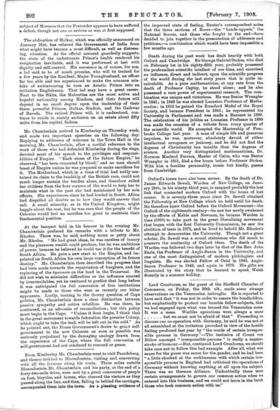At the banquet held in his honour in the evening
Mr. Chamberlain prefaced his remarks with a tribute to Mr. Rhodes. There was, he said, nothing mean or petty about Mr. Rhodes. "He had great ideas, he was careless of luxin-y and the pleasures wealth could produce, but he was ambitious of power, because he believed he could use it for the benefit of South Africa. He gave a new start to the Empire, and im- printed on South Africa his own large conception of its future destiny." Mr. Chamberlain then described the progress that had been made towards the repatriation of burghers, and the replacing of the bytocrners on the land in the Transvaal. He did not wish to minimise difficulties or the influence exerted by irreconcila.bles, yet he ventured to predict that long before it was anticipated the full concession of free institutions might be made to those who were so recently our bitter opponents. Lastly, turning to the thorny question of Cape politics, Mr. Chamberlain drew a clear distinction between passive sympathy and active rebellion. He was there, he continued, as an advocate of reconciliation ; but this policy must begin in the Cape. "Unless it does begin, I think that in the great movement towards federation the premier Colony, which ought to take the lead, will be left out in the cold." As he pointed out, the Home Government's desire to grail self- government to the new Colonies as soon as possible was seriously prejudiced by the damaging analogy drawn from the experience of the Cape, where the full concession of self-government had not conduced to concord or peace.










































 Previous page
Previous page